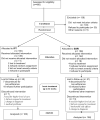Predictors and moderators of time to remission of major depression with interpersonal psychotherapy and SSRI pharmacotherapy
- PMID: 20380782
- PMCID: PMC3275416
- DOI: 10.1017/S0033291710000553
Predictors and moderators of time to remission of major depression with interpersonal psychotherapy and SSRI pharmacotherapy
Abstract
Background: Although many studies suggest that, on average, depression-specific psychotherapy and antidepressant pharmacotherapy are efficacious, we know relatively little about which patients are more likely to respond to one versus the other. We sought to determine whether measures of spectrum psychopathology are useful in deciding which patients with unipolar depression should receive pharmacotherapy versus depression-specific psychotherapy.
Method: A total of 318 adult out-patients with major depression were randomly assigned to escitalopram pharmacotherapy or interpersonal psychotherapy (IPT) at academic medical centers at Pittsburgh, Pennsylvania and Pisa, Italy. Our main focus was on predictors and moderators of time to remission on monotherapy at 12 weeks.
Results: Participants with higher scores on the need for medical reassurance factor of the Panic-Agoraphobic Spectrum Self-Report (PAS-SR) had more rapid remission with IPT and those with lower scores on the psychomotor activation factor of the Mood Spectrum Self-Report (MOODS-SR) experienced more rapid remission with selective serotonin reuptake inhibitor (SSRI) pharmacotherapy. Non-specific predictors of longer time to remission with monotherapy included several panic spectrum and mood spectrum factors and the Social Phobia Spectrum (SHY) total score. Higher baseline scores on the 17- and 25-item Hamilton Depression Rating Scales (HAMD-17 and HAMD-25) and the Work and Social Adjustment Scale (WSAS) also predicted a longer time to remission, whereas being married predicted a shorter time to remission.
Conclusions: This exploratory study identified several non-specific predictors but few moderators of psychotherapy versus pharmacotherapy outcome. It offers useful indicators of the characteristics of patients that are generally difficult to treat, but only limited guidance as to who benefits from IPT versus SSRI pharmacotherapy.
Figures



References
-
- Akiskal HS. The emergence of the bipolar spectrum: validation along clinical epidemiologic and familial-genetic lines. Psychopharmacology Bulletin. 2007;40:99–115. - PubMed
-
- American Psychiatric Association Task Force for the Handbook for Psychiatric Measures: Handbook of Psychiatric Measures. 1 st Edition American Psychiatric Association; Washington DC: 2000.
-
- Beck AT, Rush AJ, Shaw BF, Emery G. Cognitive Therapy of Depression Guiliford Press, New York, NY. Association; Washington, DC: 1979.
-
- Brückl TM, Wittchen HU, Höfler M, Pfister H, Schneider S, Lieb R. Childhood separation anxiety and the risk of subsequent psychopathology: results from a community study. Psychotherapy and Psychosomatics. 2007;76:47–56. - PubMed
Publication types
MeSH terms
Substances
Grants and funding
LinkOut - more resources
Full Text Sources
Research Materials

